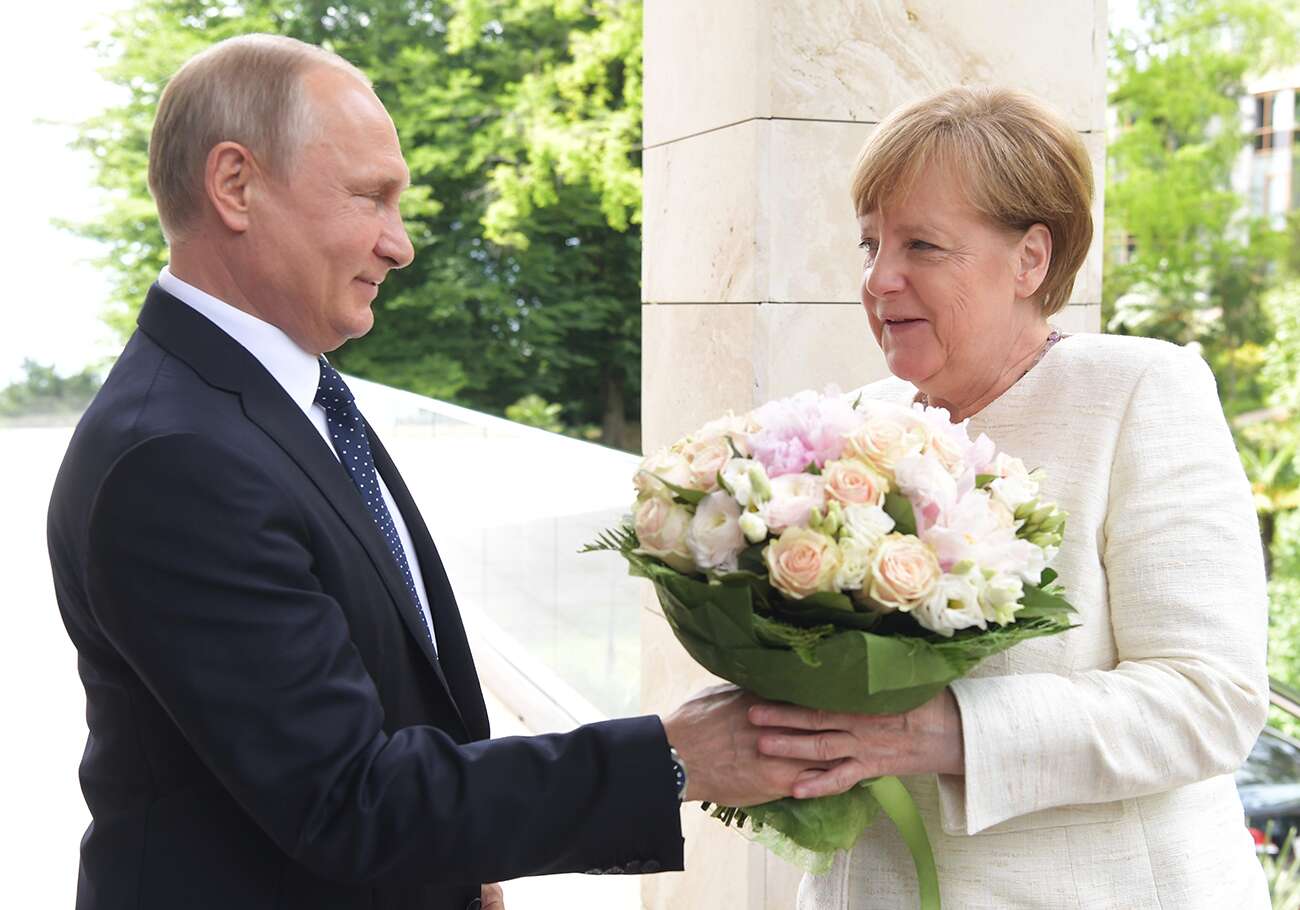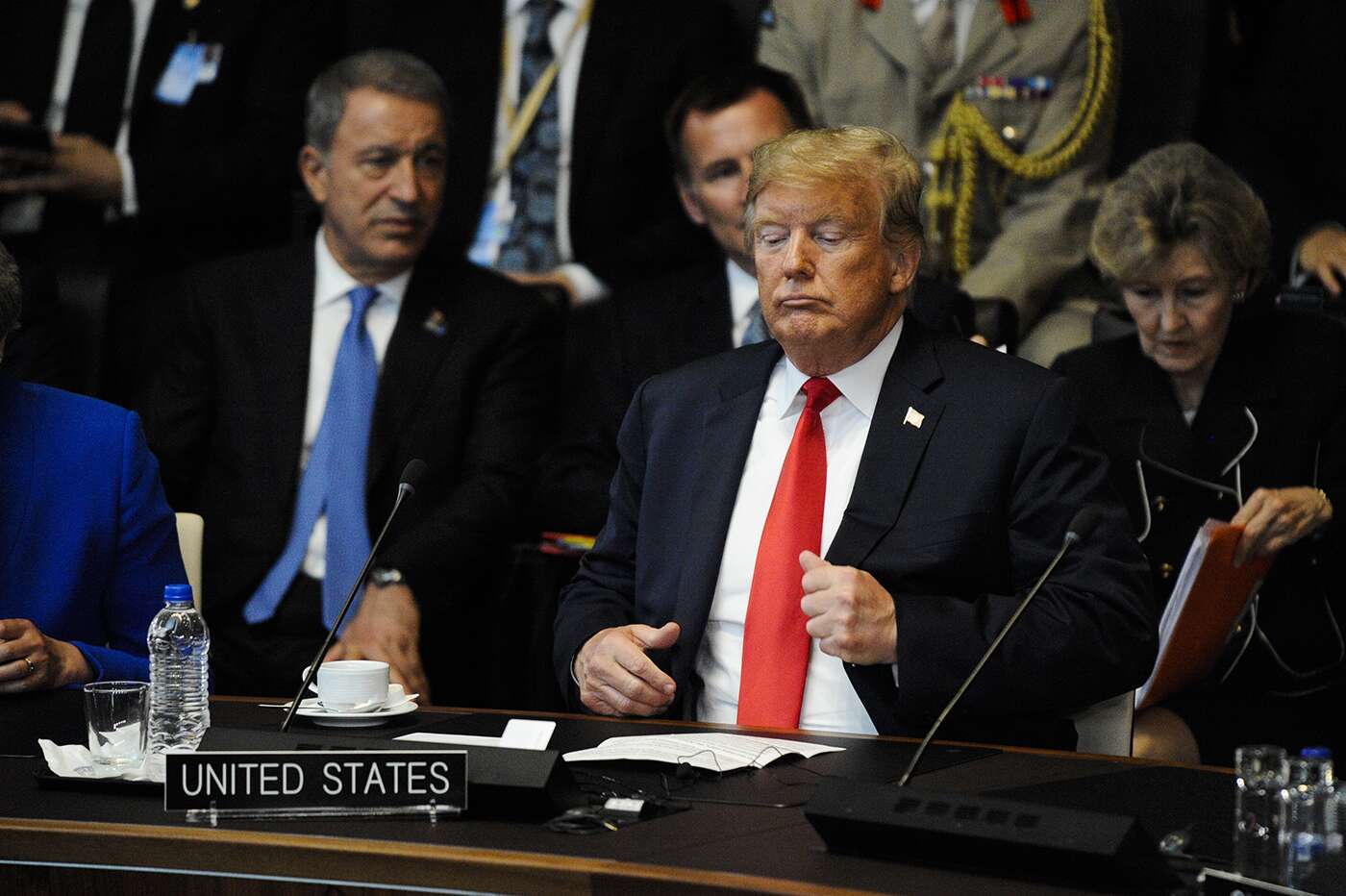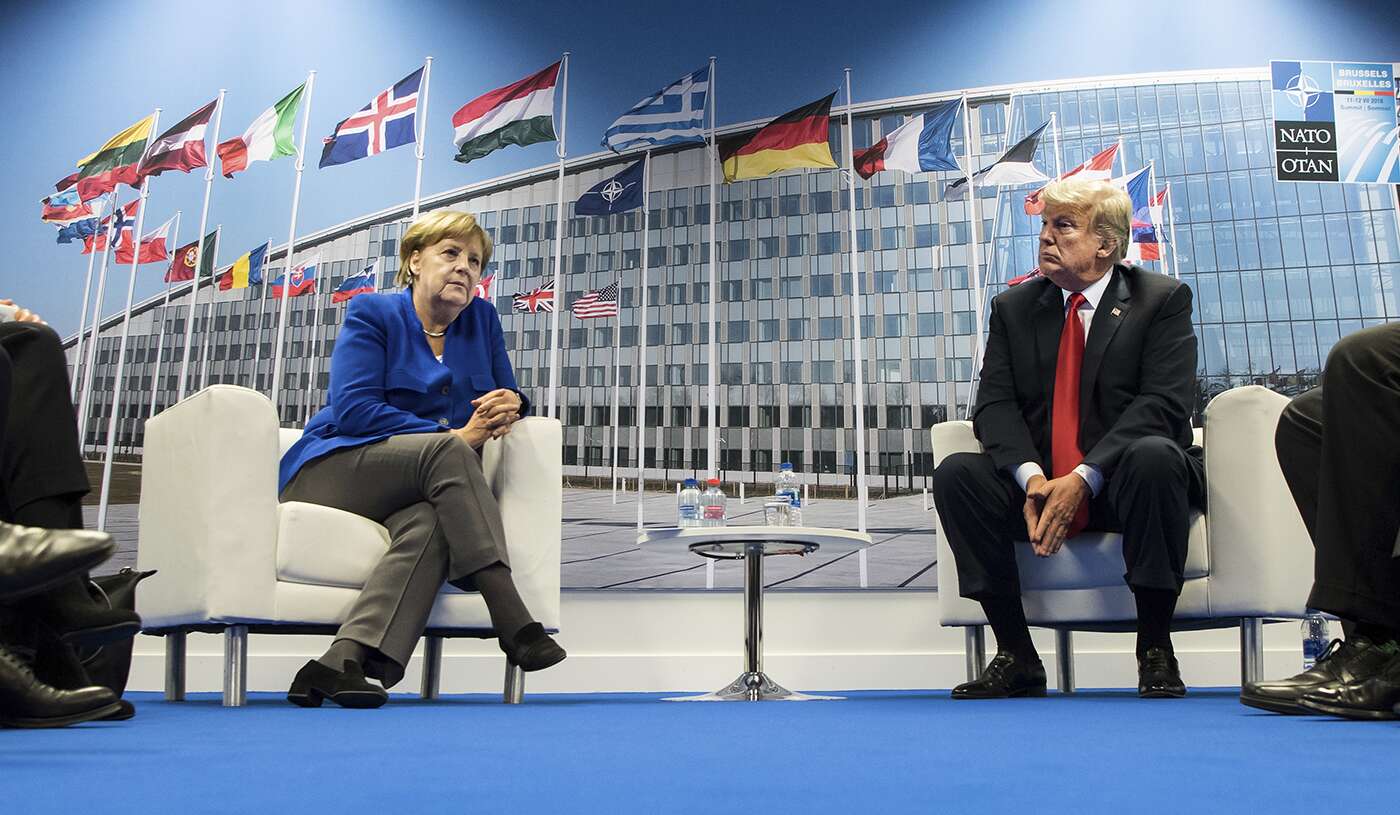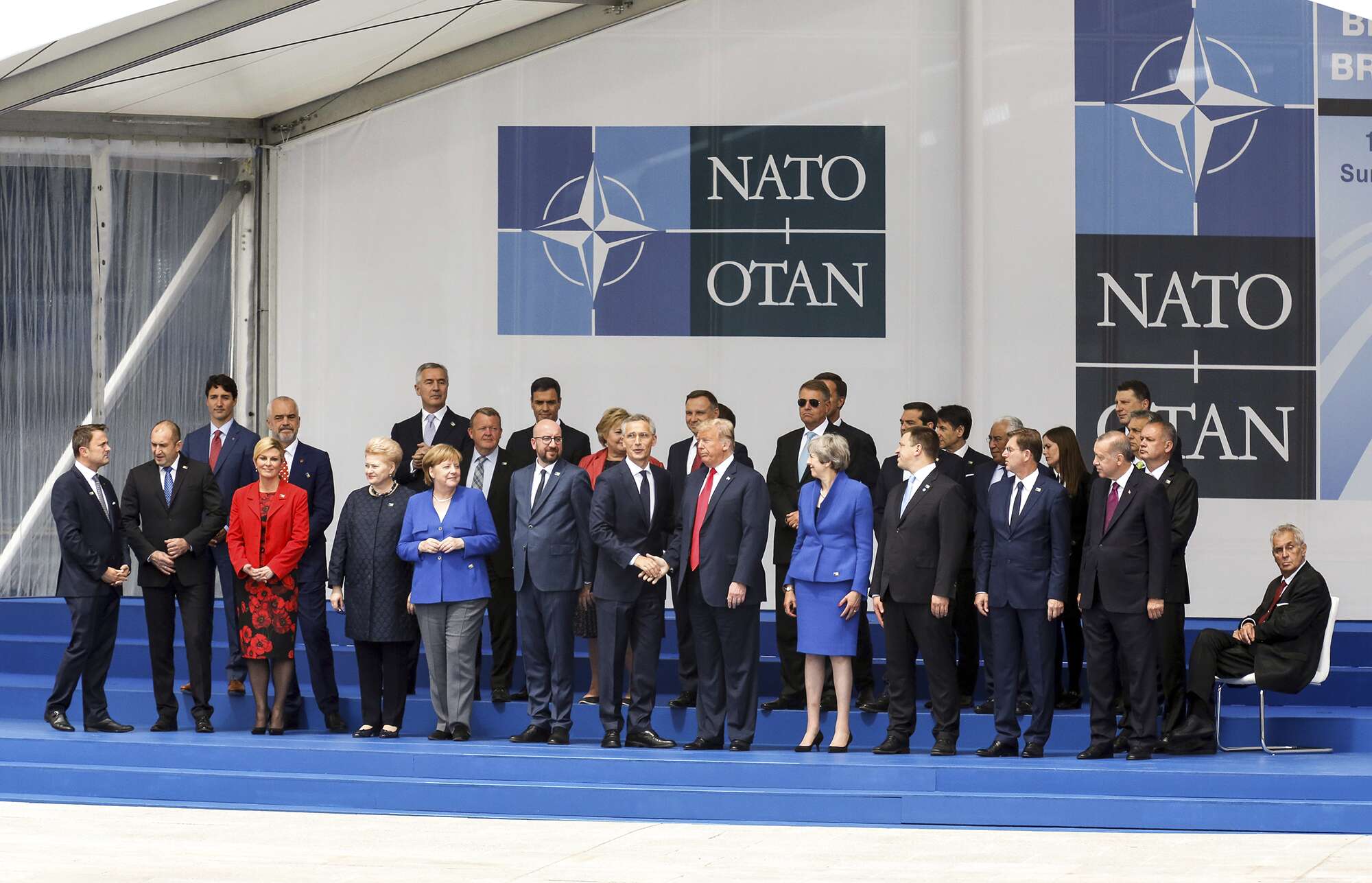President Donald Trump unleashed a scathing monologue about Germany’s investment, or lack thereof, in its own defense and its energy dependence on Russia, in which he stated that “Germany is totally controlled by Russia.” The on-camera verbal onslaught on Berlin’s policies occurred at a breakfast with the NATO’s Secretary General Jens Stoltenberg and dovetailed with the Trump administration’s general claim that NATO countries are not paying their fair share when it comes to defense spending and the collective good. It also coincides with the general malaise the President has shown towards the organization that dates back to the beginning of his presidential campaign.
Here’s exactly what Trump said about Germany’s lack of sovereignty:
“If you look at it, Germany is a captive of Russia… They got rid of their coal plants. They got rid of their nuclear. They’re getting so much of the oil and gas from Russia. I think it’s something that NATO has to look at. I think it’s very inappropriate.”
You can see the part where he says Germany is controlled by Russia here:
You can and should watch the entire largely one-sided exchange below:
https://youtube.com/watch?v=jrnjje-Nvjs%3Frel%3D0
As it is with many things Trump, it’s not what he says necessarily but when, where, and especially how he says it. For the record, I have written at length about how Trump is right to demand more out of NATO partners. The U.S. subsidizes NATO countries’ defense to an overwhelming degree and it’s clear that many members could and should do more, especially considering the rise of Russia’s far more aggressive foreign policy over the last four years.
Setting a monolithic percentage of GDP goal alone may not be a perfect way of doing it, and maybe this should change as well, with specific capability needs factored in, but it is the best single indicator we have as to how much each country is investing into their military. Currently, that goal is that all NATO countries spend two percent of GDP on defense, which many, including the some of the richest members, are not coming close to meeting. But that goal was slated to be achieved by the middle of the next decade, not overnight. Trump now is demanding that it is met far sooner.
Still, Germany, in particular, has a crumbling military that is becoming woefully impotent and mismatched when it comes to capabilities versus capacity. It pays just 1.2 percent of GDP for defense and Trump is right, Berlin does have a uniquely close relationship with Moscow. This is due to a number of factors, including the fact that half country was once part of the Soviet Union, with the infrastructure that goes along with it. Part of this is also due to the increasing amount of its energy supplies coming from Russia. In 2015, Germany imported 63.5 percent of its energy, and Russia provided a sizeable amount of those imports—roughly 35 percent of the gas and 40 percent of the oil. Those numbers are only increasing in Russia’s favor as a new natural gas pipeline is being established.
These imports are strategic in nature and could potentially make Germany’s policy decisions vulnerable to Russian influence. But that type of trade works both ways to some degree as well, with Russia receiving critical financial support from Germany in exchange for natural gas—money that they would hate to lose over a diplomatic woe or even a conflict. In other words, the old axiom that trade leads to stability and peace still holds true, but Germany’s addiction to Russian energy gives Moscow a greater strategic advantage over the country than vice versa.
So it makes sense for Trump to address these issues, he should be applauded for doing so as they are strategically valid and important to NATO and the United States. But doing so on camera, in a demeaning and scathing manner, and stating that Germany is “controlled by Russia,” which it isn’t despite its energy exporting relationship with the country, is totally uncalled for and amounts to a strategic loss for all those involved.
Putin greeting Merkel during a recent visit to Sochi for one-on-one talks.
Above all other goals, this is exactly what Vladimir Putin has longed for—a fissure in the NATO alliance and in military unity among ‘the West’s’ most powerful states. This strategic concern should supersede any the possibility of any gains that could be realized by having Germany quickly commit more cash to defense or becoming less reliant on Russian energy imports. In essence, Trump’s words couldn’t have been written better by the Russians themselves.
Right idea, but the wrong execution—something that has plagued this administration’s foreign policy from the outset.
The same message could have been delivered behind closed doors or even in an official communique, addressing each concern in detail diplomatically. If Trump insisted on talking about it on camera, then each issue could have been noted without demeaning one of our closest allies and declaring that their government is controlled by the same potential enemy that NATO is most concerned with countering. And really, all this is just complaining.
Why not lay out a firm framework that describes clear consequences for Germany and other states for not meeting the two percent goal by a particular timeline and/or a restructuring of NATO’s collective defense capability goals altogether?
Trump’s declaration of Russia’s control over Germany also invites a lot of criticism and outright claims of hypocrisy considering its own ongoing Russian influence woes. Also the fact that Trump himself has been quick to chide the leadership of foreign allies but rarely Vladimir Putin, a man he is meeting with one-on-one in just a few days no less, also continues to raise eyebrows.
The thing is, many NATO countries are already moving in the right direction when it comes to upping defense spending and it was largely understood that a commitment to redouble these efforts would come out of this summit regardless of Trump’s rhetoric. But now Trump is demanding countries spend four percent of GDP on defense, which is higher than the 3.6 percent of GDP the U.S. currently plows into military spending. Such a goal is very unlikely to be realized, at least anytime in the foreseeable future, and it would require the U.S. to increase its own $700B+ defense budget, which is already seen by many as totally unsustainable.
Trump also stated that countries owe the U.S. money retroactively for subsidizing their defense, stating:
“Many countries are not paying what they should. And, frankly, many countries owe us a tremendous amount of money for many years back, where they’re delinquent, as far as I’m concerned, because the United States has had to pay for them… So if you go back ten or 20 years, you’ll just add it all up. It’s massive amounts of money is owed.”
Some will say the new four percent goal and the retroactive payments are just bargaining tactics, but even so, they could turn off member states from even trying to reach the two percent goal in the short term as there seems to be no end in sight when it comes to spending beyond that goal. In Germany’s case, going to four percent would mean nearly quadrupling defense spending. For smaller and poorer NATO countries with relatively tiny defense budgets, this would be equally impossible.
So far, everyone from ex-diplomats to the German Chancellor herself has rebuked Trump’s claim about Russia’s hold on Germany. Angela Merkel responded by recalling her own upbringing in East Germany during the darkest days of the Cold War and highlighting the country’s contemporary contributions to NATO missions, stating:
I wanted to say that, because of current events, I have witnessed this myself, that a part of Germany was controlled by the Soviet Union. And I am very happy that we are today unified in freedom as the Federal Republic of Germany.
…
Germany also does a lot for NATO. We are the second largest donor of troops, we put most of our military abilities into the service of NATO and we are strongly committed in Afghanistan, where we also defend the interests of the United States of America. Because the deployment in Afghanistan has to do with the only example of Article 5.”
Other leaders, including Trump’s ‘sometimes buddy’ Emanuel Macron, dismissed the claim during a question and answer period with the press. Ex-Secretary of State John Kerry, a harsh critic of Trump’s foreign policy, lashed out in a formal press release over the statement, calling it strange and counterproductive:
But poor and damaging message delivery aside, the majority of the 29 countries that make up NATO need to step monetarily, and tighter coordination when it comes to procuring collective capabilities to make NATO as a single fighting unit more efficient and effective needs to occur. Just dumping money into a defense category isn’t enough.
In fact, in Germany’s case, the UK laughably suggested that they just invest in infrastructure, such as railways and roads, that could be used during a war, and call it military spending. This is a dim idea, especially when you considering Germany’s already famously mature transportation infrastructure and their decaying combat capabilities.
Regardless of NATO’s fiscal demands, Germany should be far more concerned with the state of their military and its atrocious readiness rates. This is about hardware and sustainment dollars to support that hardware, as well as training, not about investing in dual-use infrastructure. But there are ways of pushing Germany in the right direction, and using the alliance itself is the best mechanism for doing that, not shaming Germany on television and driving a metal spike through the heart of the world’s most successful international military alliance.
With trade becoming a much more tumultuous issue, Brexit ongoing, major political changes occurring in numerous European states, and one key NATO member’s allegiance to the pact increasingly in question, a fractured relationship between the U.S. and one of NATO’s most powerful members is the best gift the Kremlin could receive. It’s especially so just before the highly controversial summit between Putin with Trump slated for July 16th in Helsinki.
So yeah, the issue could have been handled differently to say the least.
Contact the author: [email protected]
Source: Read Full Article




